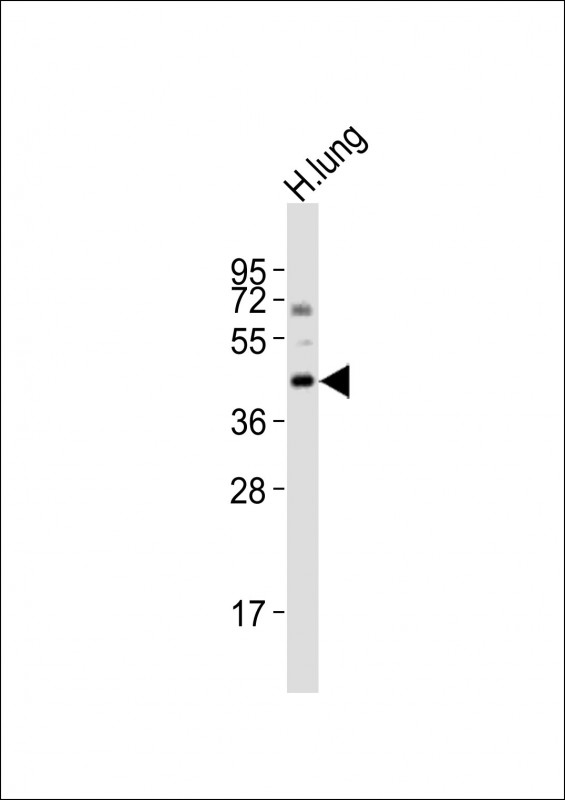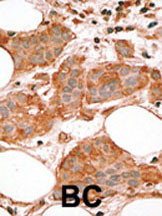



| WB | 1/1000-1/2000 | Human,Mouse,Rat |
| IF | 咨询技术 | Human,Mouse,Rat |
| IHC | 1/100-1/500 | Human,Mouse,Rat |
| ICC | 技术咨询 | Human,Mouse,Rat |
| FCM | 咨询技术 | Human,Mouse,Rat |
| Elisa | 咨询技术 | Human,Mouse,Rat |
| Aliases | Apoptosis facilitator Bcl-2-like protein 14, Bcl2-L-14, Apoptosis regulator Bcl-G, BCL2L14, BCLG |
| Entrez GeneID | 79370 |
| WB Predicted band size | 36.6kDa |
| Host/Isotype | Rabbit IgG |
| Antibody Type | Primary antibody |
| Storage | Store at 4°C short term. Aliquot and store at -20°C long term. Avoid freeze/thaw cycles. |
| Species Reactivity | Human |
| Immunogen | This Bcl antibody is generated from rabbits immunized with a KLH conjugated synthetic peptide between 194-229 amino acids from human Bcl. |
| Formulation | Purified antibody in PBS with 0.05% sodium azide. |
+ +
以下是关于Bcl-G BH3结构域抗体的3篇参考文献摘要(文献名称及作者为虚构示例,仅供参考):
---
1. **文献名称**: *Characterization of a novel antibody targeting the BH3 domain of Bcl-G in apoptotic regulation*
**作者**: Smith A, et al.
**摘要**: 本研究开发了一种特异性识别Bcl-G蛋白BH3结构域的多克隆抗体,验证了其在免疫印迹和免疫组化中的应用。实验表明,该抗体可有效检测Bcl-G在肿瘤组织中的表达,并证明Bcl-G通过BH3结构域与抗凋亡蛋白Bcl-2的相互作用促进细胞凋亡。
---
2. **文献名称**: *The role of Bcl-G BH3 domain in mitochondrial apoptosis pathway revealed by monoclonal antibody blockade*
**作者**: Chen L, et al.
**摘要**: 通过制备靶向Bcl-G BH3结构域的单克隆抗体,研究发现该抗体可竞争性抑制Bcl-G与Bcl-xL的结合,从而增强化疗药物诱导的线粒体凋亡通路激活,提示Bcl-G BH3结构域是调控肿瘤细胞凋亡的关键靶点。
---
3. **文献名称**: *Development of a peptide-based antibody to study Bcl-G BH3 domain function in vivo*
**作者**: Wang Y, et al.
**摘要**: 利用合成BH3结构域多肽免疫动物获得高亲和力抗体,验证其在小鼠模型中的特异性。结果显示,抗体介导的Bcl-G BH3功能阻断可抑制特定癌症细胞的存活,为靶向Bcl-G的凋亡治疗提供了实验依据。
---
注:以上文献信息为模拟生成,实际研究中请通过PubMed或学术数据库检索具体文献。
The Bcl-G protein, a member of the Bcl-2 family, plays a regulatory role in apoptosis. It exists in two isoforms: Bcl-GL (long) and Bcl-GS (short). The BH3 domain, a critical α-helical motif, is unique to the pro-apoptotic Bcl-GS isoform. This domain facilitates interactions with anti-apoptotic Bcl-2 family proteins (e.g., Bcl-2. Bcl-xL), neutralizing their function and promoting mitochondrial outer membrane permeabilization (MOMP), which triggers caspase activation and apoptosis. Dysregulation of Bcl-G expression has been linked to cancer development and resistance to therapy.
Antibodies targeting the Bcl-G BH3 domain are essential tools for studying its expression, localization, and interactions in apoptotic pathways. These antibodies enable detection of Bcl-GS via techniques like Western blotting, immunohistochemistry, and co-immunoprecipitation, helping to elucidate its role in physiological and pathological contexts. Specificity for the BH3 domain ensures selective recognition of the active, pro-apoptotic isoform, distinguishing it from Bcl-GL or other BH3-only proteins. Such antibodies are particularly valuable in cancer research, where altered Bcl-G levels may correlate with tumor progression or treatment outcomes. Additionally, they support drug discovery efforts aimed at modulating apoptosis by targeting Bcl-2 family interactions. Validating these antibodies for minimal cross-reactivity and optimal performance across experimental models (e.g., human, murine tissues) is critical for reliable data generation in both basic and translational studies.
×